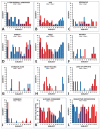The Assessment of Overall Hangover Severity
- PMID: 32183161
- PMCID: PMC7141364
- DOI: 10.3390/jcm9030786
The Assessment of Overall Hangover Severity
Abstract
The aim of this study was to critically evaluate and compare the different methods to assess overall hangover severity. Currently, there are three multi-item hangover scales that are commonly used for this purpose. All of them comprise a number of hangover symptoms for which an average score is calculated. These scales were compared to a single, 1-item scale assessing overall hangover severity. The results showed that the hangover symptom scales significantly underestimate (subjective) hangover severity, as assessed with a 1-item overall hangover severity scale. A possible reason for this could be that overall hangover severity varies, depending on the frequency of occurrence of individual symptoms included in the respective scale. In contrast, it can be assumed that, when completing a 1-item overall hangover scale, the rating includes all possible hangover symptoms and their impact on cognitive and physical functioning and mood, thus better reflecting the actually experienced hangover severity. On the other hand, solely relying on hangover symptom scales may yield false positives in subjects who report not having a hangover. When the average symptom score is greater than zero, this may lead to non-hungover subjects being categorized as having a hangover, as many of the somatic and psychological hangover symptoms may also be experienced without consuming alcohol (e.g., having a headache). Taken together, the current analyses suggest that a 1-item overall hangover score is superior to hangover symptom scales in accurately assessing overall hangover severity. We therefore recommend using a 1-item overall hangover rating as primary endpoint in future hangover studies that aim to assess overall hangover severity.
Keywords: alcohol; hangover; measurement; scale; severity; single item assessment; symptoms.
Conflict of interest statement
S.B. has received funding from Red Bull GmbH, Kemin Foods, Sanofi Aventis, Phoenix Pharmaceutical and GlaxoSmithKline. Over the past 36 months, A.S. has held research grants from Abbott Nutrition, Arla Foods, Bayer, BioRevive, DuPont, Fonterra, Kemin Foods, Nestlé, Nutricia-Danone, Verdure Sciences. He has acted as a consultant/expert advisor to Bayer, Danone, Naturex, Nestlé, Pfizer, Sanofi, Sen-Jam Pharmaceutical, and has received travel/hospitality/speaker fees Bayer, Sanofi and Verdure Sciences. Over the past 36 months, J.C.V. has held grants from the Dutch Ministry of Infrastructure and the Environment, Janssen, Nutricia, and Sequential, and acted as a consultant/expert advisor to Clinilabs, Morelabs, Red Bull, Sen-Jam Pharmaceutical, Toast!, and ZBiotics. A.K.S. has received funding from the Daimler and Benz Foundation. A.J.A.E.V.D.L. has no conflicts of interest to declare.
Figures






References
Publication types
LinkOut - more resources
Full Text Sources
Other Literature Sources

